GRI-Appendix
Specific Standard Disclosures
-
Employment
401 Employment
103 - Generic Disclosures on Management Approach
NIBE monitor the employee turnover rate. In some countries, the KPI indicates access to the workforce, as there can be significant seasonal differences in the turnover rate. We strive to find ways to retain employees on a regular long-term basis in countries where the tradition and culture is mainly for short-term employment, as this enhances productivity and minimises loss of competent employees.
401-1 - New employee hires and employee turnover
Employee turnover is calculated based on permanent employees who voluntarily end their employment. The employee turnover rate for 2017 was 6,7 percent.
Employee turnover is calculated based on permanent employees who voluntarily end their employment. The 6,7 percent figure is based on just over 100 NIBE companies worldwide. As in 2015 and 2016, plants in Mexico and China have not been included in the statistics as the traditionally high level of mobility in these countries deviates considerably from that in other countries. Employee turnover is 46 percent.
401-2 - Benefits provided to full-time employees that are not provided to temporary or part-time employees
Not reported.
401-3 - Parental leave
Not reported.
-
LaborManagement Relations
402 Labor/management relations
402-1 - Minimum notice periods regarding operational changes
Not reported.
-
Occupational Health and Safety
403 Occupational health and saftey
103 - Generic Disclosures on Management Approach
Health and safety is one of our most important topics, ranked very high in our materiality analysis both internally and by our external stakeholders. Safety performance has a direct impact on NIBE overall performance as a Group, productivity, stability and ability to create trust as employer, supplier and asset.
NIBE work hard to improve the working environment at all plants to create a safe workplace. The ultimate goal is to achieve workplaces where no accidents occur. The partial target is to have an accident rate of fewer than 6 accidents for every million hours worked by the end of 2020.
NIBE expect all companies in the Group to live up to NIBE shared policies and regularly monitor working conditions in own operations to ensure they meet our standards. During site visits the management present how they have implemented the Group’s values, how they work within the areas of health and safety to reach the goal of zero accidents.
Nonconformities in 2017 primarily concerned deficiencies in the physical working environment and lack of maintenance of machinery and buildings. There were no cases of child labor, forced labor or any breach of other principles relating to labor law.403-1 - Workers representation health and safety committees
Work of health and safety committees represent 87 (87) percent of the workforce.
403-2 - Types of injury and rates of injury, occupational diseases, lost days, and absenteeism, and number of work-related fatalities
For NIBE employees the lost time injury frequency per million hours worked was 11 (10.1) and sick leave was 3.6 (3.8) percent. Including contractors, the lost time injury frequency was 11,2. There have been no work-related fatalities .
During 2017 there were 292 recordable injuries and 51 high potential incidents for direct employees. Companies with more than 15 employees and an accident frequency of more than 10 accidents per million hours worked must draw up a written action plan for how they will
achieve the Group target.Number of lost days due to occupational disease was 838 days.
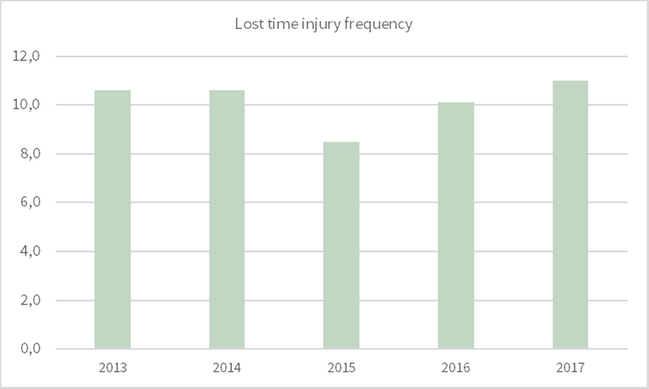
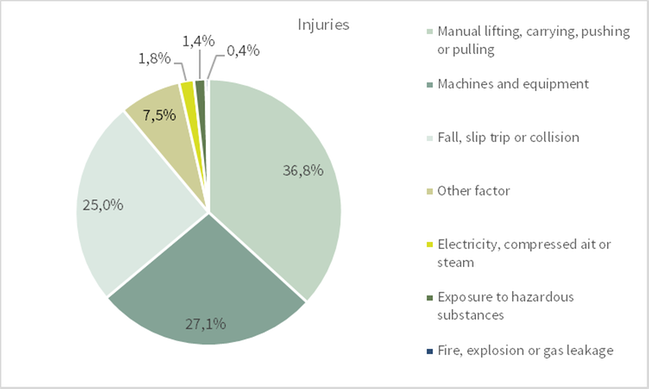
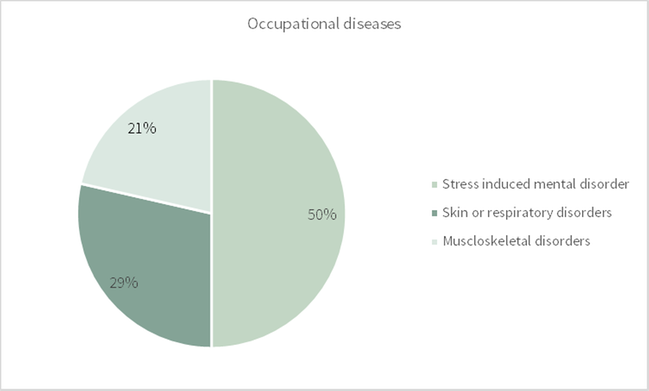
403-3 - Workers with high risk of diseases
Not reported.
403-4 - H&S safety topics covered in formal agreements with trade unions
Not reported.
-
Training and Education
404 Training and education
103 - Generic Disclosures on Management Approach
NIBE operations are knowledge-intensive and subject to constant development, which means that employees need to continuously make use of the opportunity to develop their skills. Competence development is important for all companies within NIBE Group in order to secure efficiency and competitiveness.
NIBE has a decentralized human resources management, with local HR units identifying training and development gaps and opportunities for the local employee population.404-1 - Average hours of training per year per employee
A total of 250 200 (190 000) hours of training were conducted in various areas in 2017. This is equivalent to approximately 18 (16) hours of training per employee.
Number of training hours
Europe
North America
Asia and Australia
Number of training hours, male production employees
35 922
62 727
2 291
Number of training hours, female production employees
20 015
74 257
2 390
Number of training hours, male administrative employees
23 631
13 681
426
Number of training hours, female administrative employees
8 408
5 561
304
Total per region
87 976
156 226
5 411
404-2 - Programs for upgrading employee skills and transition assistance programs
Not reported
404-3 - Percentage of employees receiving regular performance and career development reviews
In 2017 the reported total percentage of employees receiving documented performance and career development reviews was 69 (60) percent.
Number of career reviews
Europe
North America
Asia and Australia
Number of career reviews, male production employees
2 469
1 401
176
Number of career reviews, female production employees
755
1 179
107
Number of career reviews, male administrative employees
1 801
661
132
Number of career reviews, female administrative employees
597
392
97
Total per region
5 622
3 633
512
-
Diversity and Equal Opportunity
405 Diversity and equal opportunity
103 - Generic Disclosures on Management Approach
Diversity and equal opportunity are part of NIBE's core values and our commitment to respect human rights. That commitment applies to all levels and all companies within the NIBE Group. Regardless of language, ethnicity, gender, age or background, everyone deserves respect and the same opportunities without any form of discrimination. We strive to work in a way that guarantees tolerance to differences and gives everyone the same opportunities for development, training and careers.
Equal salary for equal job between men and women is a basic part of non-discriminative practices. According to our increased focus on fairness and equality, we include equal remuneration, according to our policy, as a topic for discussion in connection with company visits.
A new Diversity and Equal treatment policy was published in the Group during 2017. All companies will implement this policy during 2018.405-1 - Composition of governance bodies and other indicators of diversity
The Board of Directors for NIBE Group consists of four men and two women. Their ages are between 57 and 66, with an average of 62.2. All are of Swedish nationality.
The three business areas have informal boards of directors at BA level and formal boards at the different company levels, as some of the subsidiaries also have subsidiaries.
Gender equality, number
Europe
North America
Asia and Australia
Group
Women in managerial position
83
95
37
215
Women in local management teams
51
55
15
121
Women in Boards of directors
9
6
0
15
Age distribution, number of employees
Europe
North America
Asia and Australia
Group
Management team members age over 50
150
93
10
252
Management team members age 30-50
158
115
50
253
Management team members age under 30
7
9
1
17
Board members age over 50
111
94
5
210
Board members age 30-50
72
9
3
84
Board members age under 30
0
0
0
0
Number of employees age over 50
2 100
1 197
60
3 357
Number of employees age 30-50
3 911
2 586
774
7 271
Number of employees age under 30
1 307
1 174
276
2 757
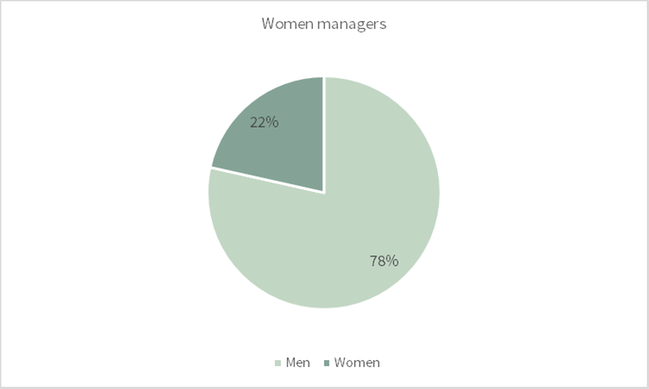
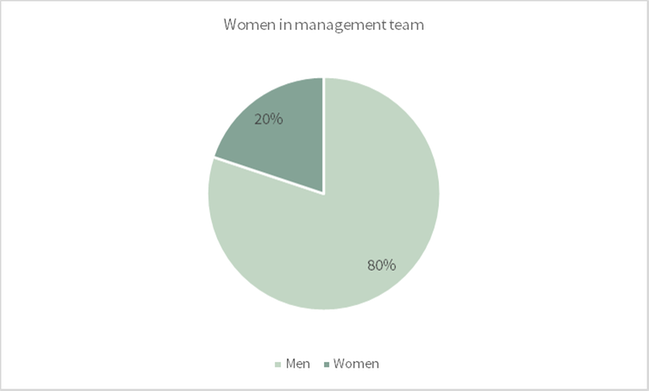
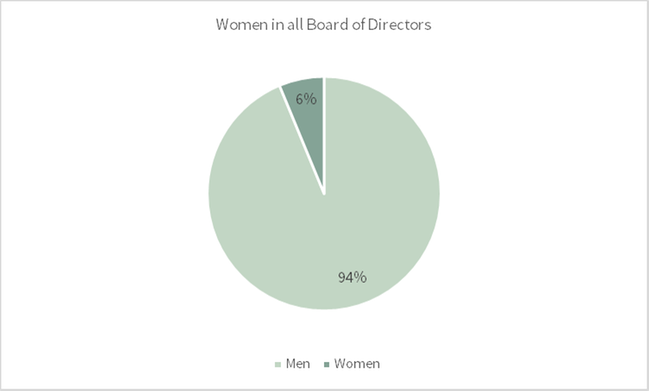
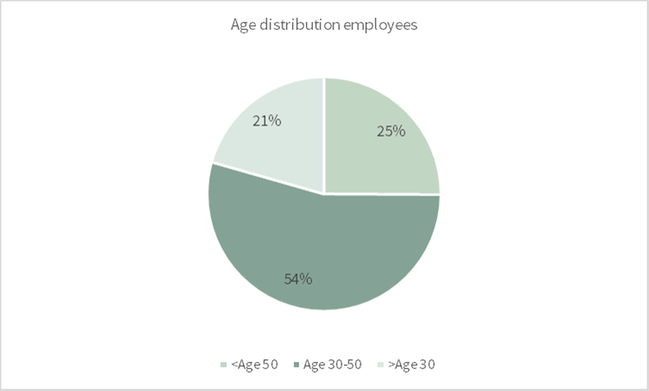
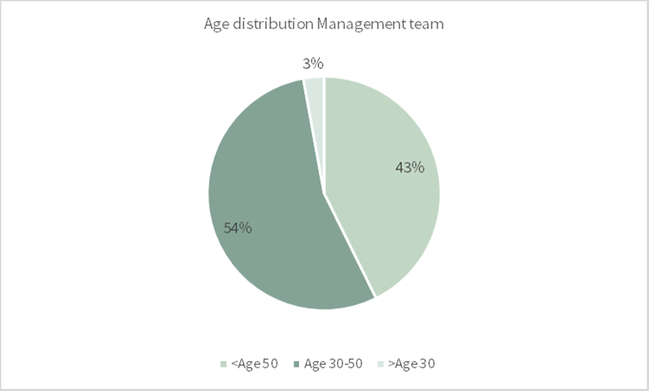
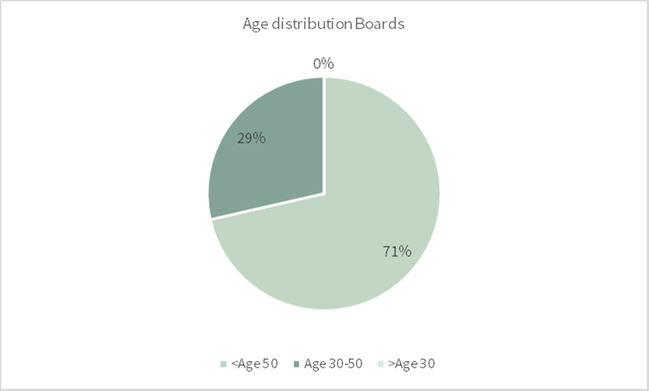
405-2 - Ration of basic salary and remuneration of men to women
Not reported.
-
Non-discrimination
406 Non-Discrimination
103 - Generic Disclosures on Management Approach
In an international group, you realize that respecting cultural and social differences is essential in order to be able to co-operate. Regardless of language, ethnicity, gender, age or background, everyone wants to be respected and have the same opportunities without any form of discrimination.
NIBE will strengthen the focus on non-discrimination further by issuing a policy for anti-discrimination, diversity and gender equality. The work of subsidiaries will be evaluated in connection with site visits against the policy and national legislation.406-1 - Total number of incidents of discrimination and corrective actions taken
In 2017, there was 1 (0) report of an incident involving discrimination. Corrective actions followed the HR policy.
-
Freedom of association and collective bargaining
407 Freedom of association and collective bargaining
103 - Generic Disclosures on Management Approach
Freedom of association and collective bargaining are human rights and every responsible employer must provide the right conditions to ensure that workers' rights and concerns are being handled correctly.
407-1 - Operations and suppliers in which the right to freedom of association and collective bargaining may be at risk
Some of NIBE companies are located in countries where legislation restricts unions from working independently. In these cases we make sure that there are internal procedures and control systems that ensure well functioning grievance mechanisms and constructive dialogue with workers' representatives. In all cases, the national labor standard legislation is the minimum level concerning employment terms and working conditions. NIBE encourage the suppliers to apply the same principles concerning workers' rights and labor standards.
-
Child labor
408 Child labor
103 - Generic Disclosures on Management Approach
Harmful child labor deprives children of their childhood, education and well-being and must be abolished. NIBE do not accept child labor in our premises and do not choose to do business with any company, supplier or customer if it comes to our knowledge that they allow child labor.
408-1 - Operations and suppliers identified as having significant risk for incidents of child labor, and measures taken
NIBE own operations have no risk for child labor. NIBE periodically visit operations world wide to make sure that legislation is followed and that labor standards comply with internationally accepted standards.
Concerning the suppliers, it has not been identified any significant risk for child labor. Assessing the suppliers from a human rights point of view is an ongoing process. -
Forced or compulsory labor
409 Forced or compulsory labor
103 - Generic Disclosures on Management Approach
NIBE do not accept forced labor in our premises and do not continue business with a company if it comes to our knowledge that they allow forced labor.
409-1 - Operations and suppliers identified as having significant risk for incidents of forced or compulsory labor, and measures taken
NIBE own operations have no risk for forced labor. We periodically visit the operations world wide to make sure that legislation is followed and that labor standards comply with internationally accepted standards.
Concerning the suppliers, it has not been identified any significant risk for forced labor. Assessing the suppliers from a human rights point of view is an ongoing process. -
Security Practices
410 Security practices
103 - Generic Disclosures on Management Approach
NIBE do not have employed armed security personnel. NIBE employees working with security receive training in Our Values, including human right in connection to introduction training.
410-1 - Security personnel trained in human rights policies or procedures
Not reported.
-
Rights of Indigenos peoples
411 Rights of indigenous people
103 - Generic Disclosures on Management Approach
NIBE Our Values states:
- We value and develop diversity among our employees.
- We do not give any one special treatment regarding their employment or duties.
411-1 - Incidents of violations involving rights of indigenous peoples
Not reported.
-
Human Rights Assessment
412 Human rights assessments
103 - Generic Disclosures on Management Approach
As part of the annual risk assessments including sustainability risks, all companies within the NIBE Group are also obliged to go through their human rights risks and make an evaluation.
412-1 - Operations that have been subject to human rights reviews or impact assessments
Not reported.
412-2 - Employee training on human rights policies or procedures
In 2017, 4 754 employees received training in human rights policies and 10 860 hours were devoted to training on human rights policies
412-3 - Significant investment agreements and contracts that include human rights clauses or that underwent human rights screening
Not reported.
-
Local communities
413 Local communities
103 - Generic Disclosures on Management Approach
All companies have a responsibility to act according to Our Values and Principles as good citizens in the communities where we are present.
NIBE do not collect specific information on local engagement and impact assessments. We do however follow reports through grievance mechanisms and information about potential impact on local communities that might come as a result of our annual risk assessments.413-1 - Operations with local community engagement, impact assessments, and development programs
Many of our companies are major employers in the local communities in which they operate. Each company has great freedom, within the framework of Our Values, to decide how it wants to contribute to the development of its community. In 2017, local initiatives relating to culture, sport, health and young people were sponsored to the tune of SEK 2,3 million (1,8 million).
413-2 - Operations with significant actual and potential negative impacts on local communities
Not reported.
-
Supplier Social assessment
414 Supplier social assessment
103 - Generic Disclosures on Management Approach
Human rights assessment is part of NIBE new evaluation system and is to be made before on boarding of new suppliers. NIBE have started to roll out new procedures and tools to the companies within the NIBE Group, but as the procurement organisation largely is decentralized, it will take some years before this will be fully implemented. For existing suppliers NIBE are planning assessment according to the same procedures and criteria as used for new suppliers.
414-1 - New suppliers that were screened using social criteria
New suppliers that were screened against social criteria in 2017 were 23 (7) percent.
414-2 - Negative social impacts in the supply chin and actions taken
We have not registered any negative social impacts during 2017.
-
Public Policy
415 Anti-corruption
103 - Generic Disclosures on Management Approach
NIBE policy is that we do not give contributions to any political part or organization.
Our Values states:
- We do not contribute to or involve ourselves with political parties, politicians or political organizations.
All companies report the monetary value and the type of contributions they have given during the reporting period.
415-1 - Monetary value
0 (0) SEK.
-
Customer Health Safety
416 Customer privacy
103 - Generic Disclosures on Management Approach
NIBE product development and sourcing teams work according to a number of directives and legal requirements. Besides legal demands according to a number of directives, NIBE also have specific requirements from customers. At NIBE the products' function, quality, safety and environmental characteristics are the most important conditions for the Group's continued development.
Our Values states:
- "We strive to make our products contribute to sustainable development when they are used by the customer – energy efficiency, ecodesign and lifecycle thinking are important keywords for us.
- Our products must fulfil agreements and legal norms and standards regarding health and safety during use.
- We have relevant and clear information about safe and environmentally adapted installation, use, maintenance, storage and final disposal.
- We ensure that the customer gets fast responses to product questions and requests for information.
416-1 - Assessment of the health and safety impacts of product and service categories
The directives and legal requirements or customer requirements are tested to international or local standards, internal at NIBE or at third party during the development phase and in manufacturing.
416-2 - Incidents of non-compliance concerning the health and safety impacts of products and services
Not reported.
- "We strive to make our products contribute to sustainable development when they are used by the customer – energy efficiency, ecodesign and lifecycle thinking are important keywords for us.
-
Marketing and Labeling
417 Market communications
103 - Generic Disclosures on Management Approach
NIBE follow national and regional legislation, and see it as a competitive advantage to give correct and sufficient information about our products.
NIBE market communication must be reliable and based on facts at all times.
417-1 - Requirements for product and service information and labeling
NIBE follow directives, national and regional legislation and customer requirements.
NIBE are required to keep track on:
- Whether each of the following types of information is required by the organization’s proceduresfor product and service information and labeling:
- The sourcing of components of the product or service;
- Content, particularly with regard to substances that might produce an environmentalor social impact;
- Safe use of the product or service;
- Disposal of the product and environmental or social impacts;
- Other (explain).
- The sourcing of components of the product or service;
- Percentage of significant product or service categories covered by and assessed for compliance with such procedures.
417-2 - Incidents of non-compliance concerning product and service information and labeling
No incidents reported during 2017.
417-3 - Incidents of non-compliance concerning marketing communications
No incidents reported during 2017.
- Whether each of the following types of information is required by the organization’s proceduresfor product and service information and labeling:
-
Customer Privacy
418 Customer privacy
103 - Generic Disclosures on Management Approach
NIBE have clear internal procedures how to protect customer privacy and how to secure data. There are policies how to work in order to not reveal sensitive data to non-authorized parties. NIBE follow data protection legislation, GDPR, and have a systematic approach towards preventing data theft, hacker attacks and other attempts to compromise our IT-systems.
Business principles state:
- Our customers must always have full confidence in our company, products and employees
- We must be a safe and constructive partner
418-1 - Substantiated complaints concerning breaches of customer privacy and losses of customer data
No incidents reported during 2017.
-
Socioeconomic Compliance
419 Socioeconomic Compliance
103 - Generic Disclosures on Management Approach
It is essential for the company’s good reputation to comply with all legislation and voluntary commitments.
Our Values states:
- We have a zero tolerance approach to breaches of key areas of the Code of Conduct. This applies, for example, to compliance with the application of human rights and issues such as bribery, corruption and competition law. In the other areas we work systematically and purposefully with continuous improvements.
419-1 - Non-compliance with laws and regulations in the social and economic area
No incidents were reported during 2017.
